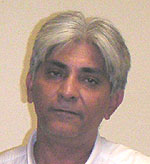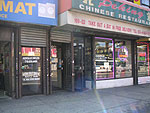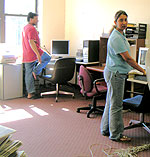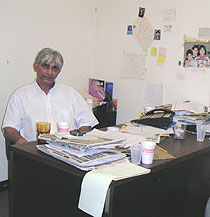| Pakistani Journalist Keeps American Readers Informed--in Urdu |
New York
30 November 2005
|
|
Dragan Report-Download RealAudio - Download (Real)
 Dragan Report-Download RealAudio
- Listen (Real)
Dragan Report-Download RealAudio
- Listen (Real)

 |
| Mohammad Farooqi, editor of New York-based Pakistan Post | The New York metropolitan area is home to an extremely varied and active ethnic press. Some 200 magazines and newspapers in over 90 languages other than English are regularly published in the city. Today on New American Voices, we talk with Mohammad Farooqi, the editor of one of New York's six Urdu-language publications -- the Pakistan Post.
 |
| Pakistan Post is located on this commercial street in Jamaica, Queeens, New York | The large, light-filled, newspaper-cluttered office of the Pakistan Post is up a narrow staircase in a two-storey building on a busy and somewhat seedy commercial street in Jamaica, an ethnically-mixed outlying section of New York City. The founder and editor of the Pakistan Post, Mohammad Farooqi, says his weekly publication is not intended solely for Urdu speakers in the New York area, but for Pakistani immigrants throughout the eastern part of the United States and Canada as well. The paper, he says, has something for everyone. "We have two big sections," he explains. "One we call standard pages, like the New York Times, Washington Post, a little oversized. Then we insert a tabloid magazine. In the newspaper section we have news, views, and sometimes surveys and some interviews; and in the magazine sections we have columns - political columns, economic columns, satire, short stories, then a science section also, literature, film, sports -- we try to cover every aspect of life."
The newspaper is striking to look at. Although the articles are printed in neat black Urdu text, the many advertisements are often in color, featuring a variety of Urdu and English fonts and many photographs. Indeed, more than half the paper's contents seem to be advertisements. Mr. Farooqui admits that advertising is what supports his operation, and allows him to distribute his newspaper for free. "We are based on advertisement (revenue), and our community on the largest scale, you can say, is supporting us -- all [kinds of] Pakistani business people, you know, from groceries to telephone companies," he says. "We have some American mainstream business also, like Western Union and some airlines, and a lot of business we have is from car showrooms, insurance, law offices, medical offices… So from all aspects of life you can say we have business from there."
 |
| At work on the Pakistan Post | The Pakistan Post's circulation in the United States is about 20,000 copies, Mr. Farooqi says -- with the same amount distributed in Canada. But each copy, he estimates, is read by 10 to 15 people, so the newspaper's reach in the Pakistani community is considerable. When he started the Pakistan Post twelve years ago, Mohammad Farooqi says he had the very specific goal in mind to "educate my community, tell about America, the whole system, especially democracy, human rights, economy, and all those things which we don't have in our country, and we have to learn here to try to implement in our country."
In addition, Mr. Farooqi believes that an ethnic newspaper has to serve its readers as a source of information and advice on many of the practical issues of everyday life. "Let me tell you one thing," he says, "Immigrants always have the same problem, it doesn't matter if they're from Pakistan or from Poland or England. The first generation always doesn't know about the system. And basically, they don't want to know about that, because they have to maintain home, children, family, social status, economical status. They just work, the whole day and the whole night!"
In its first years, the Pakistan Post also dedicated a lot of space to news from South Asia -- India, Pakistan, Bangladesh. But Mr. Farooqi says that after the terrorist attacks of September 11, 2001, his readers needed to be kept abreast of events and decisions in this country that directly affected their lives. So now 70 percent of the news in the paper is from the United States.
Mohammad Farooqi says that for his community, and even for him personally, September 11th was a watershed event. "Everything is changed, from every aspect -- politically, economically, socially," he says. "I don't know how I can explain it. Before, you know, I was not feeling I was an alien. You know, I can speak like other local American people, with the policeman, with any security agency, or any shopkeeper, any politician. But now I'm feeling I'm an alien. And let me explain one thing," he adds. "Nobody asked me anything, nobody bothered me. But I have a fear. Maybe because of the media, maybe because there's some noise which is around us, every day, all the time. Everything is changed now, but how, I cannot explain it to you."
Mohammad Farooqi has been in the United States for 15 years. He says he decided to leave Pakistan because of the political situation there. Back home he was a respected journalist and political activist, known for writing bold articles in a country whose government was not receptive to such candor. In the United States, he was able to continue in his chosen profession, and to continue to press for the democratization of his native country. He works 18-hour days, 7 days a week, and has not had a vacation for as long as he can remember. But he says he would not have it otherwise.
 |
| Mohammad Farooqi at his desk | "I was thinking about it since I was a child: I'm going to do something good for humanity, for the community, for civilization, for my country or my people," he says. "I don't know how much I did it, but I'm trying my best to do it. You know, everyone wants to become a celebrity. In what manner is an entirely different argument. Some people want to become an artist, some people want to become a dictator - everybody has a different mentality. I wanted to become a celebrity. 'Oh, this is Mr. Farooqi, who works very hard for the community, who works very hard for the society, for democracy, for human rights, this is the guy that because of him we got politics changed.' This is my dream. That's why I'm working," says Mohammad Farooqi - editor, publisher, Pakistani community activist -- and, above all, journalist.
 E-mail This Article
E-mail This Article
 Print Version
Print Version
|

